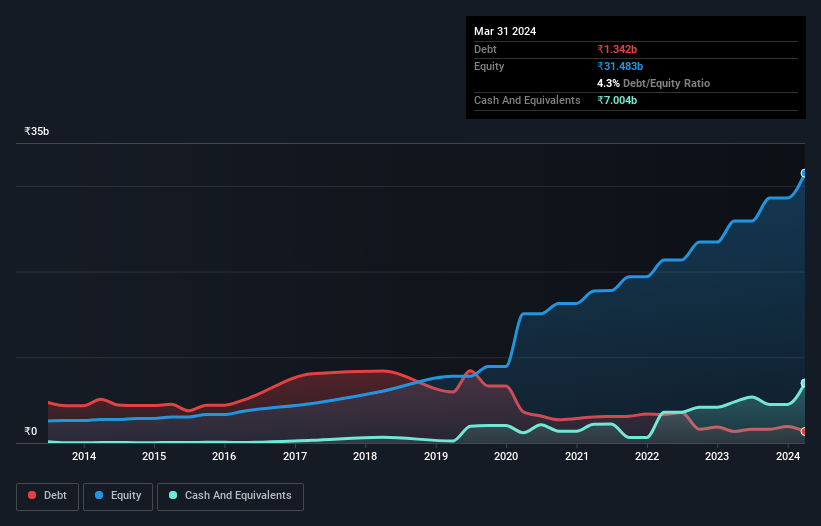
The external fund manager backed by Berkshire Hathaway's Charlie Munger, Li Lu, makes no bones about it when he says 'The biggest investment risk is not the volatility of prices, but whether you will suffer a permanent loss of capital.' It's only natural to consider a company's balance sheet when you examine how risky it is, since debt is often involved when a business collapses. We can see that KEI Industries Limited (NSE:KEI) does use debt in its business. But is this debt a concern to shareholders?
Why Does Debt Bring Risk?
Generally speaking, debt only becomes a real problem when a company can't easily pay it off, either by raising capital or with its own cash flow. If things get really bad, the lenders can take control of the business. However, a more frequent (but still costly) occurrence is where a company must issue shares at bargain-basement prices, permanently diluting shareholders, just to shore up its balance sheet. Of course, plenty of companies use debt to fund growth, without any negative consequences. When we examine debt levels, we first consider both cash and debt levels, together.
Check out our latest analysis for KEI Industries
What Is KEI Industries's Debt?
The chart below, which you can click on for greater detail, shows that KEI Industries had ₹1.34b in debt in March 2024; about the same as the year before. However, it does have ₹7.00b in cash offsetting this, leading to net cash of ₹5.66b.

How Strong Is KEI Industries' Balance Sheet?
According to the last reported balance sheet, KEI Industries had liabilities of ₹14.3b due within 12 months, and liabilities of ₹768.5m due beyond 12 months. On the other hand, it had cash of ₹7.00b and ₹15.3b worth of receivables due within a year. So it can boast ₹7.18b more liquid assets than total liabilities.
Having regard to KEI Industries' size, it seems that its liquid assets are well balanced with its total liabilities. So it's very unlikely that the ₹367.2b company is short on cash, but still worth keeping an eye on the balance sheet. Succinctly put, KEI Industries boasts net cash, so it's fair to say it does not have a heavy debt load!
Also good is that KEI Industries grew its EBIT at 19% over the last year, further increasing its ability to manage debt. When analysing debt levels, the balance sheet is the obvious place to start. But ultimately the future profitability of the business will decide if KEI Industries can strengthen its balance sheet over time. So if you want to see what the professionals think, you might find this free report on analyst profit forecasts to be interesting.
Finally, while the tax-man may adore accounting profits, lenders only accept cold hard cash. KEI Industries may have net cash on the balance sheet, but it is still interesting to look at how well the business converts its earnings before interest and tax (EBIT) to free cash flow, because that will influence both its need for, and its capacity to manage debt. In the last three years, KEI Industries's free cash flow amounted to 41% of its EBIT, less than we'd expect. That weak cash conversion makes it more difficult to handle indebtedness.
Summing Up
While we empathize with investors who find debt concerning, you should keep in mind that KEI Industries has net cash of ₹5.66b, as well as more liquid assets than liabilities. And it impressed us with its EBIT growth of 19% over the last year. So we don't think KEI Industries's use of debt is risky. Of course, we wouldn't say no to the extra confidence that we'd gain if we knew that KEI Industries insiders have been buying shares: if you're on the same wavelength, you can find out if insiders are buying by clicking this link.
When all is said and done, sometimes its easier to focus on companies that don't even need debt. Readers can access a list of growth stocks with zero net debt 100% free, right now.
If you're looking to trade KEI Industries, open an account with the lowest-cost platform trusted by professionals, Interactive Brokers.
With clients in over 200 countries and territories, and access to 160 markets, IBKR lets you trade stocks, options, futures, forex, bonds and funds from a single integrated account.
Enjoy no hidden fees, no account minimums, and FX conversion rates as low as 0.03%, far better than what most brokers offer.
Sponsored ContentValuation is complex, but we're here to simplify it.
Discover if KEI Industries might be undervalued or overvalued with our detailed analysis, featuring fair value estimates, potential risks, dividends, insider trades, and its financial condition.
Access Free AnalysisHave feedback on this article? Concerned about the content? Get in touch with us directly. Alternatively, email editorial-team (at) simplywallst.com.
This article by Simply Wall St is general in nature. We provide commentary based on historical data and analyst forecasts only using an unbiased methodology and our articles are not intended to be financial advice. It does not constitute a recommendation to buy or sell any stock, and does not take account of your objectives, or your financial situation. We aim to bring you long-term focused analysis driven by fundamental data. Note that our analysis may not factor in the latest price-sensitive company announcements or qualitative material. Simply Wall St has no position in any stocks mentioned.
About NSEI:KEI
KEI Industries
Manufactures, sells, and markets wires and cables in India and internationally.
Excellent balance sheet with limited growth.
Similar Companies
Market Insights
Community Narratives



